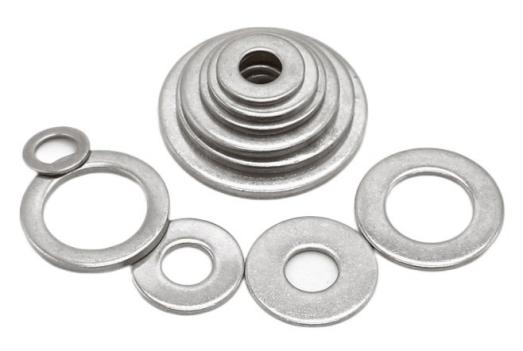Washers are indispensable components utilized across various applications, spanning from automotive engines and plumbing systems to electrical connections and industrial machinery. Serving as fundamental elements for load distribution and tight sealing between surfaces, they play a crucial role in preventing leaks, corrosion, and other potential issues. Despite their widespread use, questions regarding the proper installation, selection, and maintenance of washers may still arise. Here, we address common inquiries to assist users in making informed decisions and ensuring the safe and effective performance of washers in their applications.

How to Install a Washer?
Installing a washer involves a straightforward process. Here are the basic steps:
Select the Correct Washer: Choose the appropriate size and type of washer for your application.
Placement: Position the washer onto the fastener, ensuring it sits flush against the surface being fastened.
Fastening: Insert the fastener through the hole in the washer and into the corresponding hole in the surface being fastened.
Tightening: Use a wrench or socket to tighten the fastener, applying the correct amount of torque.
Lock Washer Usage: If employing a lock washer, place it onto the fastener between the nut or bolt head and the washer.
Final Tightening: Fully tighten the nut or bolt to the required torque, ensuring the joint is secure and the washer properly seated.
Verification: Inspect the joint to confirm its security and the washer's proper installation.
It's important to note that the installation process may vary depending on the application and washer type. Always refer to the manufacturer's instructions and adhere to best practices for safe and effective installation.
Can Crush Washers Be Reused?
Crush washers are designed for single-use applications and should not be reused. These washers deform upon tightening to create a tight seal between surfaces, typically in automotive or plumbing settings. Once deformed, the crush washer cannot revert to its original state, compromising its sealing ability upon reuse.
Attempting to reuse a crush washer can lead to leaks or other complications, as the washer may fail to recreate the initial level of deformation or seal. Therefore, it's advisable to utilize a new crush washer whenever a seal is required, even if the used washer appears undamaged.
How to Clean Washers?
Regular cleaning of washers is crucial to maintain their functionality and ensure reliable joint performance. Here are some cleaning tips:
Regular Maintenance: Clean washers periodically to remove dirt, debris, or contaminants that may accumulate over time.
Inspection: Routinely inspect washers for signs of wear, damage, or corrosion. Replace any worn or damaged washers promptly.
Proper Storage: Store washers in a clean, dry, and protected environment to prevent corrosion or deterioration. Avoid exposure to moisture or corrosive substances.
Correct Selection: Choose the appropriate washer type and size for your application to optimize joint performance and longevity.
By following these cleaning practices, users can ensure that washers function effectively and provide dependable joint performance over time.
Are Washers Suitable for High-Temperature or High-Pressure Applications?
The suitability of washers for high-temperature or high-pressure applications depends on their material composition and design. Here are four types of washers recommended for such conditions:
Stainless Steel Washers: Known for their corrosion resistance and strength, stainless steel washers excel in high-temperature and high-pressure environments. They are commonly used in industrial and automotive applications that demand superior temperature and pressure resistance.
Inconel Washers: Inconel, a family of superalloys, offers exceptional high-temperature resistance and strength. Inconel washers find applications in aerospace and chemical processing industries where extreme temperature and corrosive conditions are prevalent.
PTFE Washers: Polytetrafluoroethylene (PTFE) washers boast chemical resistance and non-stick properties, making them suitable for high-temperature and corrosive environments. They are frequently utilized in chemical processing and food and beverage industries.
Copper or Aluminum Flat Washers: While flat washers made of copper or aluminum materials are appropriate for high-temperature applications like automotive engines or electrical connections, they are not recommended for high-pressure conditions due to their lower strength.

When selecting washers for high-temperature or high-pressure applications, factors such as operating conditions, material compatibility, and specific requirements must be considered. Consulting with a qualified professional or the manufacturer can aid in determining the most suitable washer for a particular application.
In conclusion, understanding the the proper use, selection, and maintenance of washers is essential for achieving optimal performance and reliability in diverse applications. By following recommended practices and guidelines, users can ensure the effective functioning of washers and the integrity of their assemblies.